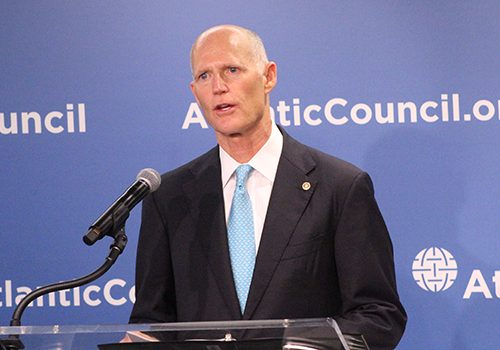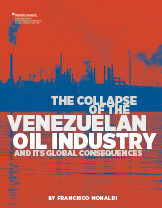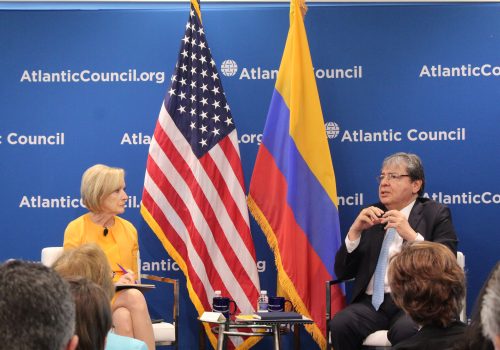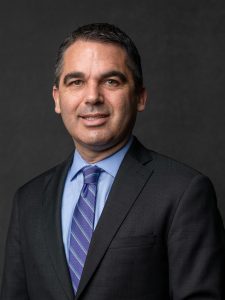Russia’s intervention in Venezuela: What’s at stake?
Key points
- Deepening Kremlin involvement in Venezuela's economy
- Moscow sowing further instability in the United States’ own hemisphere
- Russia frustrating efforts to restore democracy in Venezuela
Absent of civil war, Venezuela is suffering the world’s worst humanitarian crisis in recent memory. Malnourished children search for their next meal. Parents lack access to even the most basic medicine for their families. Rampant inflation makes money instantaneously worthless, while general lawlessness provides a breeding ground for illicit trade with tentacles that reach from the Americas to Europe and beyond.1Megan Specia, “Five Things You Need to Know to Understand Venezuela’s Crisis,” New York Times, May 3, 2019, https://www.nytimes.com/2019/05/03/world/americas/venezuela-crisis-facts.html.
It is an astonishing crash for a country bestowed with the world’s largest oil reserves and that was once a beacon of prosperity and a thriving democracy. Today, twenty years after Hugo Chávez became president and six years after his successor, Nicolás Maduro, inherited the presidential palace, Venezuela’s breakneck descent into one of the world’s top crises has renewed a push for democratic change. Following Maduro’s assumption of a fraudulent new term in office, much of the world’s attention and optimism turned to Juan Guaidó, president of the National Assembly, and as of January 23, 2019, the interim president of Venezuela is now recognized by more than fifty democracies.2David Luhnow and José de Córdoba, “Venezuela’s Opposition Held Talks With Government on Ousting Maduro,” Wall Street Journal, May 1, 2019, https://www.wsj.com/articles/venezuelas-opposition-held-talks-with-government-on-ousting-maduro-11556767656.
But Guaidó and other democratic forces face headwinds for reasons beyond the repression and violence unleashed by the Maduro regime. External actors are using Venezuela as a battleground for their own selfish national interests, bolstering the corrupt and faltering Maduro regime. Cuba, Turkey, China, and, importantly for this analysis, Russia, are key actors that have provided lifelines of support to Maduro and his cronies. These external forces, each in their own way, are frustrating the will of the Venezuelan people to restore democracy. A poll taken in April 2019 by the Atlantic Council’s Adrienne Arsht Latin America Center found that 62 percent of Venezuelans see Russia in either a negative light or as a direct threat to peace or national sovereignty—a clear repudiation of Russia’s increasingly assertive role in Venezuela.
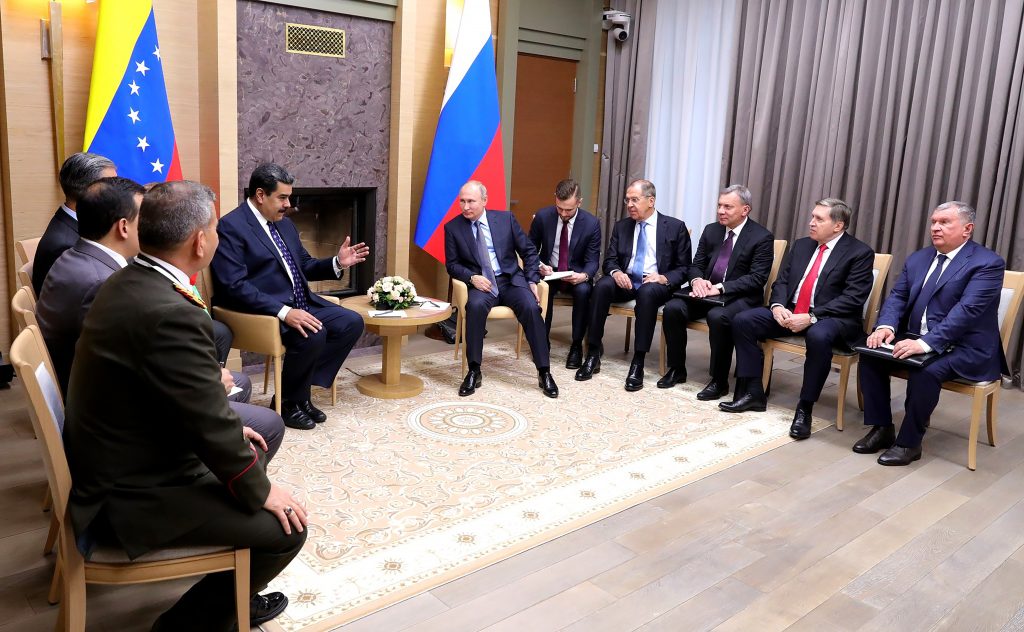
Kremlin policy seeks to undermine the international liberal order by supporting a friendly authoritarian ruler fraudulently “re-elected”…
President Putin meets with Nicolás Maduro in Moscow on December 5, 2018. (Left to right) Nicolás Maduro, President Vladimir Putin, his translator, Foreign Minister Sergei Lavrov, Deputy Prime Minister Yuri Borisov, Russian career diplomat Yuri Ushakov, and Rosneft CEO Igor Sechin. Photo: President of Russia
Why has Moscow thrown its weight behind Maduro? The answer is rooted partly in the increasingly difficult relations between Moscow and Washington over the past fifteen years, as well as in Russian President Vladimir Putin’s original foreign policy vision dating back to his first days in office.
That vision has several critical elements, which have driven Kremlin policy for most of the millennium and buffet traditional Russian, and Soviet objectives in the Western Hemisphere:
- restoring Russia as a great power on the international stage that has the ability to influence issues in every corner of the globe;
- ensuring Russian hegemony in the “near abroad,” the independent countries that were part of the Soviet Union and the tsarist empire;
- substituting a multipolar international system for the US-dominated unipolar system of the 1990s and early 2000s;
- preventing “color revolutions” that the Kremlin believes overthrow legitimate, if corrupt and un-democratic, governments around the world;
- serving as a spoiler to the United States, undercutting US interests where possible, and using peripheral issues like Venezuela to sustain US-Russian dialogue and Russia’s role as an arbiter of international security; and
- undermining the rules-based liberal international order, which restricts Moscow’s pursuit of its declared interests in its neighborhood and globally, and the transatlantic alliance that undergirds that order.
A late addition to the list was the imperative to thwart “color revolutions,” in which civil society groups drive anti-democratic leaders from power—as seen by Putin’s response to the Rose Revolution in Georgia in 2003 and the Orange Revolution in Ukraine in 2004.
Consistent with these policy drivers, the Kremlin has pursued an increasingly robust and mutually advantageous relationship with the leftist regime in Caracas since Chávez first reached out to Putin in 2000. By 2003, the two had met three times.3“Российско-венесуэльские отношения,” Посольство Российской Федерации в Боливарианской Республике Венесуэла, accessed July 22, 2019, https://venezuela.mid.ru/rossijsko-venesuel-skie-otnosenia. For Putin, these contacts would be particularly useful as relations between the United States and Russia entered a downward spiral. The next decade and a half would bring the Rose and Orange revolutions, Putin’s sharp denunciation of the United States and the West at the Munich Security Conference in February 2007, the Kremlin’s cyberattack on Estonia in the summer of 2007,4Joshua Davis, “Hackers Take Down the Most Wired Country in Europe,” Wired, August 21, 2007, https://www.wired.com/2007/08/ff-estonia/. its invasion of Georgia in 2008, Moscow’s invasion of Ukraine and annexation of Crimea and war in Donbas in 2014, the Kremlin’s escalation in Syria in 2015 and challenge to American allies and forces there, and Moscow’s interference in the 2016 US presidential election.
The political utility of the tie to Venezuela was evident in 2008, when Moscow sent TU-160 strategic bombers to Venezuela for a joint naval exercise in the Caribbean Sea.5Simon Romero and Clifford J. Levy, “Russia and Venezuela Confirm Joint Military Exercises,” New York Times, September 8, 2008, https://www.nytimes.com/2008/09/09/world/americas/09venez.html. This served as a counterpoint to US support for an increasingly pro-Western Ukraine and for Georgian President Mikheil Saakashvili during Moscow’s war on Georgia; Chávez offered Russia the use of a Caribbean coastal air base in 2010.
Economic considerations provided additional reasons for Moscow to develop closer relations with Caracas. Venezuela became a significant market for Russian energy companies and arms makers, as Venezuela used Russian credits to buy $4 billion worth of weapons from 20056Jeremy Wolland, “Venezuela, Russia Sign Weapons Deal,” Arms Control Association, September 2006, https://www.armscontrol.org/act/200h6_09/VenRussia. to 2008;7Vladimir Rouvinski, “Russian-Venezuelan Relations at a Crossroads,” Woodrow Wilson International Center for Scholars, February 2019, https://www.wilsoncenter.org/sites/default/files/russia-venezuela_report_rouvinski_final.pdf. the principal Russian oil company, Rosneft, began to invest heavily in Venezuela.8Christian Lowe and Rinat Sagdiev, “How Russia sank billions of dollars into Venezuelan quicksand,” Reuters, March 14, 2019, https://www.reuters.com/investigates/special-report/venezuela-russia-rosneft/.
Subscribe for the latest on Russia
Receive updates for events, news, and publications on Russia from the Atlantic Council.
Russian Interests and Assets in Venezuela
Moscow’s backing of Maduro supports every element of Kremlin policy listed above. It intends to demonstrate Moscow’s great power reach, thwart US policy in its own hemisphere, and underscore that a multipolar world will replace the era of American predominance. For some Russian thinkers, it presents a potential “spheres-of-influence” bargain: Moscow could drop Maduro in exchange for Washington giving Moscow free rein in its own sphere of influence in Ukraine, Georgia, and Moldova. Moreover, Kremlin policy seeks to undermine the international liberal order by supporting a friendly authoritarian ruler fraudulently “re-elected” and on the verge of falling to a democratic movement.
In Venezuela as well as Syria, the Kremlin defends its strongman allies against the consequences of elections or protests, at least in part to keep the contagion of regime change from spreading to its own shores. The success of Moscow’s policy in Venezuela rests on its military, economic, and financial clout. Russia’s investments and loans to Venezuela are certainly sizeable, but they have only kept Maduro afloat. As of July 2019, Venezuela currently owes $10 billion for the purchase of 36 Russian Su-30MK2s fighter jets,9Sebastien Roblin, “Venezuela Borrowed $10 Billion from Russia to Pay for Jet Fighters and Tanks. It Can’t Pay It Back,” The National Interest, July 27, 2019, https://nationalinterest.org/blog/buzz/venezuela-borrowed-10-billion-russia-pay-jet-fighters-and-tanks-it-cant-pay-it-back-69467. $1.1 billion for Rosneft investment into Venezuelan oilfield development,10Lilya Yapparova, ed. Alexey Kovalev, trans. Hilah Kohen and Kevin Rothrock, “Why Russia is really sending military advisers and other specialists to Venezuela,” Meduza, July 29, 2019, https://meduza.io/en/feature/2019/07/29/geopolitical-debts. and has received more than $4 billion of investment from Russia, according to Russian Economic Development Ministry.11Ibid. Given Russia’s present economic status, it is clear while these numbers are only a fraction of Russia’s total assets, Moscow continues to show a strong political commitment to Venezuela through its sale of military equipment, sending military advisors, and receiving high-profile visits from Maduro and members of his regime to the Kremlin.
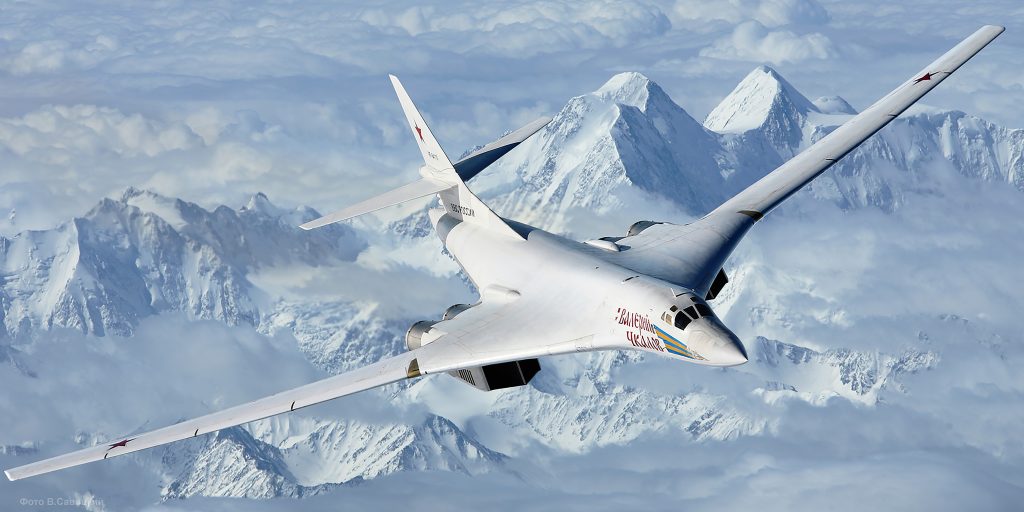
Counting its nuclear and conventional arsenals, Russia is the world’s second-ranking military power,12“2019 Military Strength Ranking,” Global Fire Power, accessed July 22, 2019, https://www.globalfirepower.com/countries-listing.asp. and over the past five years, Moscow has demonstrated its ability to deploy forces well beyond its neighborhood. Russia’s principal area of forward deployment has been Syria, where it has deployed the S-300 surface-to-air missile system,13“S-300,” Missile Threat: CSIS Missile Defense Project, accessed July 22, 2019, https://missilethreat.csis.org/defsys/s-300/. scores of surface-to-air bombers, Spetznatz forces, and the Wagner mercenary group.14Sean Crowley and Steven Luber, “Ride of the Russkis: The Wagner Group in Syria,” Leksika, March 7, 2018, http://www.leksika.org/tacticalanalysis/2018/3/7/ride-of-the-russkis-the-wagner-group-in-syria. Moscow has also deployed Wagner to Africa and Latin America.
Russia’s increased intervention in Syria in the fall of 2015 prevented the fall of President Bashar Assad’s regime, which had been steadily losing ground to various opposition groups. Moscow’s growing military cooperation with Caracas from the 2005 arms sales was initially much less ambitious. It served to strengthen a friendly regime through arms sales and to signal to Washington that Russia could operate militarily in the Western Hemisphere. Kremlin strategists saw this as a suitable response to US support for Georgia and Ukraine.
But the starkly deteriorating circumstances in Venezuela over the past eighteen months have added a new urgency to this cooperation. Once again, Putin intervened to shore up an ally who was in danger of losing power. His first play—sending two TU-160s in December 201815Giancarlo Fiorella, “Russians In Venezuela: What We Know So Far,” Bellingcat, April 4, 2019, https://www.bellingcat.com/news/americas/2019/04/04/russians-in-venezuela-what-we-know-so-far/.—was dramatic but not particularly effective: while it signaled Moscow’s ability to put strategic weapons close to the United States, the bombers would offer Maduro no help against an enraged populace seeking his ouster. But as Maduro weakened in the first months of 2019, Putin supplied the same S-300 systems to Maduro that he had provided Assad.16Ibid. This play had two objectives. First, the S-300s could help deter US military intervention on behalf of Guaidó, whom Washington and other Western countries had recognized as the legitimate leader of Venezuela. (The Trump Administration publicly had left all options on the table for dealing with the growing chaos in Venezuela.) Second, the S-300s came with Russian “experts” (soldiers), who, along with the thousands of Cuban intelligence personnel in country, could provide security for Maduro.17Martin Arostegui, “Russian Missiles in Venezuela Heighten US Tensions,” VOA News, April 29, 2019, https://www.voanews.com/americas/russian-missiles-venezuela-heighten-us-tensions.
By some measures, the Russian deployment was a success: talk of a US intervention largely ceased, although it was unlikely the United States would intervene in the first place, especially given the checkered history of US military activity in the region.
Putin is willing to subordinate economic interests to geopolitical advantage and has done so in Venezuela.”
Economically, too, Russia’s help has been invaluable to Maduro, despite Russia’s own economic vulnerabilities. The Russian economy has stagnated since at least 201218Barclay Ballard, “Russia’s Stagnating Economy,” World Finance, July 18, 2018, https://www.worldfinance.com/markets/russias-stagnating-economy. and has been hit hard the past five years by the decline in hydrocarbon prices and sanctions resulting from its war against Ukraine. After the gross national product (GNP) fell in 2014 and 2015,19“Russian Federation,” The World Bank, accessed July 22, 2019, https://data.worldbank.org/country/russian-federation. its recovery has averaged annual growth of around 2 percent since 2016,20Ibid. and the standard of living remains stagnant.
But the Russian economy is still the eleventh largest in the world—down from the ninth-largest in 2013.21“GDP (current US$),” The World Bank, accessed July 22, 2019, https://data.worldbank.org/indicator/ny.gdp.mktp.cd?most_recent_value_desc=true. More importantly, Putin is willing to subordinate economic interests to geopolitical advantage and has done so in Venezuela. In the early 2000s, major Russian hydrocarbon firms Gazprom, Rosneft, TNK-BP, Surgutneftegaz, and Lukoil were looking to invest in Venezuela; Gazprom won the rights to explore for gas offshore Venezuela in 2006.22“Russia’s Rosneft wins gas licenses in Venezuela,” BBC News, December 18, 2017, https://www.bbc.com/news/business-42388488. Under Kremlin guidance, Gazprom and other Russian hydrocarbon firms formed the National Petroleum Consortium, which in 2010 signed a contract with Petroleos de Venezuela (PDVSA) to set up a joint venture to extract heavy oil reserves in the Orinoco River Basin.
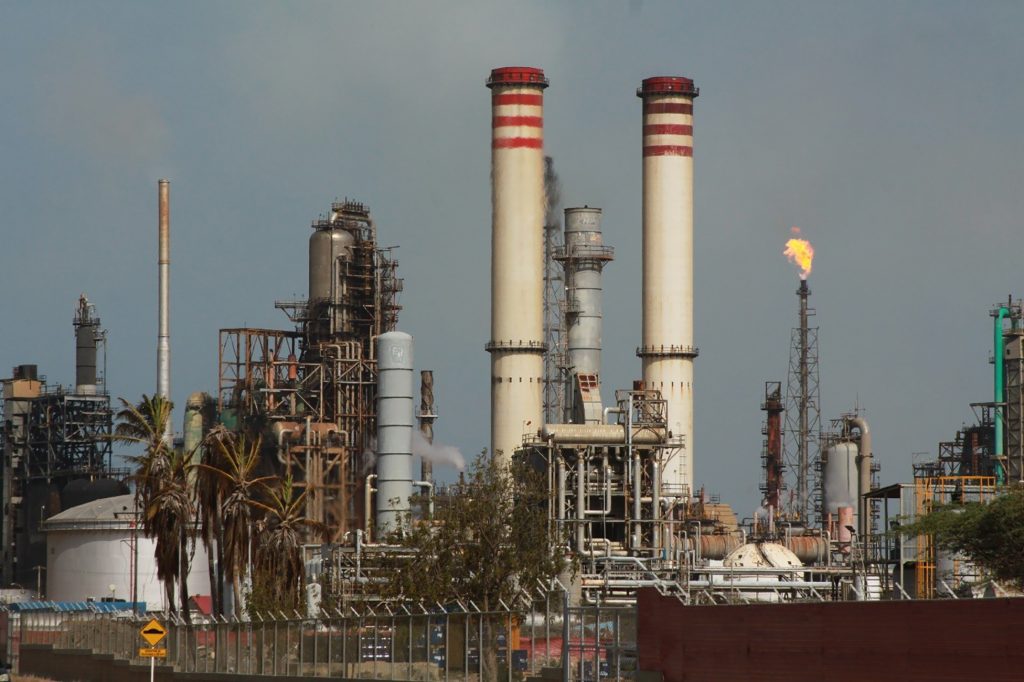
Even as the Russian economy took blow after blow, the Kremlin took on new economic burdens to shore up its ally in the Western Hemisphere…”
PDVSA has developed large refinery facilities to process raw materials for export such as the Paraguaná Refinery Complex (pictured) on Venezuela’s Caribbean coast. Rosneft has become Venezuela’s largest oil trader, taking 44 percent of PDVSA exports in July and 66 percent in August, 2019. Photo: Wikimedia Commons/Luis Ovalles
In 2014, Rosneft, the largest oil producer in Russia and the number two gas producer, bought out Gazprom and the other Russian firms to take control of the National Petroleum Consortium.23“Rosneft Increases its Stake in the National Oil Consortium to 80% of Shares,” Rosneft, December 23, 2014, https://www.rosneft.com/press/releases/item/173609/. Led by Putin intimate Igor Sechin, Rosneft’s activities frequently reflect the Kremlin’s geopolitical ambitions. Rosneft’s role in Venezuela was to provide a major subsidy to the government in the form of $6.5 billion24Lowe and Sagdiev, “How Russia Sank Billions.” Reuters, March 14, 2019, https://www.reuters.com/article/us-venezuela-russia-rosneft-special-repo/special-report-how-russia-sank-billions-of-dollars-into-venezuela-quicksand-idUSKCN1QV1HN. in loans to Petroleos de Venezuela in the 2014 to 2016 timeframe for providing 133,000 barrels25Marianna Parrage, “Exclusive: Venezuela’s port woes stall oil exports to Rosneft – source,” Reuters, August 29, 2018, https://www.reuters.com/article/us-venezuela-oil-exports-exclusive/exclusive-venezuelas-port-woes-stall-oil-exports-to-rosneft-source-idUSKCN1LE2NA. a day of oil. While Rosneft has become Venezuela’s largest oil trader, taking 44 percent of PDVSA exports in July and 66 percent in August,26Olga Yagova, Chen Aizhu, Marianna Parraga, “Rosneft becomes top Venezuelan oil trader, helping offset U.S. pressure”, Reuters, August 29, 2019, https://www.reuters.com/article/us-russia-venezuela-oil/rosneft-becomes-top-venezuelan-oil-trader-helping-offset-u-s-pressure-idUSKCN1VC1PF. only a fraction of the energy fields to which it has access have been developed. The value of these holdings and the untapped reserves beneath them provide the Kremlin with ways of clawing back their sunk costs, regardless of the outcome of Maduro’s regime. It could either seek long-term profits and develop energy infrastructure should Maduro stay in power, or, should the regime collapse, it could cash in and sell the rights to other foreign companies before mounting any further losses.
As of 2018, only half of the contracted oil had been delivered, but the prepayments provided urgent funds to Moscow’s Venezuelan partners in time for the 2015 parliamentary elections. Moscow’s willingness to pay this subsidy is also significant because it came as hydrocarbon prices plunged by 50 percent,27“Russian Oil Prices Drop 50% in 2015,” Moscow Times, January 11, 2016, https://www.themoscowtimes.com/2016/01/11/russian-oil-prices-drop-50-in-2015-a51404. Ukraine-related sanctions started to bite, gross domestic product (GDP) fell by over 3 percent, and the standard of living dropped by over 9 percent.28Joel Lewin, “Russian GDP contracted 3.7% in 2015,” Financial Times, January 24, 2016, https://www.ft.com/content/81b0b40f-e1d2-35cf-8b52-02d6e245daf5. Even as the Russian economy took blow after blow, the Kremlin took on new economic burdens to shore up its ally in the Western Hemisphere, proving itself a steadfast partner for Caracas.
The Kremlin has also helped dull some of the sting of US sanctions on Venezuela. In 2018, the small Russian bank Evrofinance Mosnarbank began to sell Venezuela’s new cryptocurrency, the petro,29Joshua Goodman, “Russia Bank Helps Venezuela Defy US Cryptocurrency Sanctions,” Associated Press News, May 14, 2018, https://www.apnews.com/b745c5132a544735a71e9480582240f4. created specifically to help Caracas get access to funds despite the sanctions. Evrofinance Mosnarbank is the natural venue to issue the petro: the government of Venezuela has a 49 percent share of the bank30“Treasury Sanctions Russia-based Bank Attempting to Circumvent U.S. Sanctions on Venezuela,” US Department of the Treasury, March 11, 2019, https://home.treasury.gov/news/press-releases/sm622. and the other shares belong to VTB and Gazprombank—both of which are under sanctions prompted by Moscow’s war on Ukraine. Rosneft currently circumvents sanctions by trading oil as part of debt servicing agreements with Caracas and PDVSA, which currently owes $1.1 billion as of the end of the second quarter of 2019. This system of a direct exchange of debt for oil has allowed both Moscow and Caracas to profit despite the sanctions currently in place,31Olga Yagova, Chen Aizhu, Marianna Parraga, “Rosneft becomes top Venezuelan oil trader, helping offset U.S. pressure”, Reuters, August 29, 2019, https://www.reuters.com/article/us-russia-venezuela-oil/rosneft-becomes-top-venezuelan-oil-trader-helping-offset-u-s-pressure-idUSKCN1VC1PF. with Moscow becoming the leading marketer of Venezuelan oil and adding to its influence on global markets and Caracas finding new means to service its debt and appease its supporters in the Kremlin. Moves like these allow Moscow to support its ally and help it to create a counter financial system to the one dominated by the West.
Moscow’s Gains Thus Far: A Real Win?
The Kremlin views its policy in Venezuela as a success. Moscow aims to use its relationship with Caracas as a point of leverage over the United States—to respond to US support for governments in Georgia and Ukraine that it does not like.
Moreover, Maduro’s future quickly became more precarious in early 2019, with the United States hinting about using its military to oust him. In response, Putin deployed the S-300s32Arostegui, “Russian Missiles in Venezuela.” and Russian “trainers” arrived to prop up Maduro. Washington paused talk about all options being on the table.33Vanessa Romo, “Pompeo Says U.S. Prepared to Offer Guaido ‘Full Range of Options To Oust Maduro,’” NPR, May 5, 2019, https://www.npr.org/2019/05/05/720481685/pompeo-says-u-s-prepared-to-offer-guaid-full-range-of-options-to-oust-maduro. So Putin places Venezuela alongside Syria as a place where he saved “his guy” and prevented the West from putting its preferred leader to take power.
Moscow also has something to gain economically from its presence in Venezuela, as it seeks to take advantage of a self-inflicted withdrawal of US energy companies from Venezuela. The US decision to temporarily extend General License 8, which allows US companies a temporary stay of presence in Venezuela, may not be extended again in October. If not, US companies’ withdrawal from Venezuela would be a boon to Russian and Chinese, energy companies. Both could acquire turnkey operations on US invested production facilities.
Yet Moscow’s Venezuelan position is not without risk and cost. Over the past fifteen years, Moscow has bought itself close relations with an increasingly authoritarian, incompetent, and illegitimate regime. The money that Russian firms put into the Venezuelan economy—which has paid no dividends—simply helped the Maduro regime get past the 2015 elections. Russian companies are losing money in Venezuela, and many have chosen to close up shop and head back to Moscow.
Most importantly, the country’s already dismal economic plight is only getting worse. Maduro clings to office only thanks to the counterintelligence support of Cuba and the loyalty of Venezuela’s military, which is not assured as the country’s deep suffering grows. And supporting Maduro will only become more costly for the Kremlin. Polls by the independent Levada Center, for example, show that a growing majority of Russians believe the country is spending too much on foreign adventures and not enough at home.34Денис Волков, “Разочарование во внешней политике,” Riddle, September 4, 2018, https://www.ridl.io/ru/razocharovanie-vo-vneshnej-politike/. What’s more, the Venezuela strategy undermines one of Russia’s major foreign policy goals; to create a multipolar world in part by encouraging unity and common cause among the BRICS countries, the association of five major emerging national economies (Brazil, Russia, India, China, and South Africa). Moscow’s support for Maduro has driven a wedge between Russia and Brazil, the South American member of BRICS, which considers the Maduro regime a regional disaster.
Moscow aims to use its relationship with Caracas as a point of leverage over the United States—to respond to US support for governments in Georgia and Ukraine…”
Putin faces one more danger from his Venezuelan adventure that dwarfs all the others. The Venezuelan deployments are difficult to support logistically, and Moscow’s ability to deploy conventional forces in the Western Hemisphere cannot compare to US capabilities. If the United States were to send its military to oust Maduro, there is little Putin could do about it. In that case, Putin would face the worst of all worlds: the loss of an ally whom he had vowed to protect, at the hands of his geopolitical foe.
Putin surely understands his military’s conventional inferiority to US forces, but he has repeatedly risked confrontation, expecting Washington to blink. For more than five years, Russian warplanes and ships have harassed American ships and planes, approaching too close and at times with their transponders turned off. More critically, Russian Wagner mercenaries repeatedly challenged US-supported opposition groups, accompanied by US forces, in Syria in 2017 and 2018.35Crowley and Luber, “Ride of the Russkis.” The last incident, in February 2018, provoked a US strike that killed hundreds of Russian fighters. Instead of protesting or retaliating, the Kremlin simply disavowed the mercenaries. Moscow could face a similar situation in Venezuela, especially given reports earlier this year that it had sent mercenaries to Caracas.
Four Scenarios: How might Russia Respond?
Although the situation in Venezuela is at an impasse, it remains highly fluid, with Maduro feeling emboldened on the one hand, but the interim government striving to sustain its momentum on the other. Guaidó is recognized as president by democracies around the world, and his government has legitimate representation at the Inter-American Development Bank.36“Development Bank Recognizes Guaido-Chosen Representative,” VOA News, March 15, 2019, https://www.voanews.com/americas/development-bank-recognizes-guaido-chosen-representative. The Lima Group—which includes Argentina, Brazil, Canada, Chile, Colombia, Costa Rica, Guatemala, Honduras, Mexico, Panama, Paraguay, Peru, and Venezuela—has condemned the Maduro regime and sought international pressure to force Caracas to hold new elections.37“Official Statement – Panama and the Lima Group condemn the actions of the Nicolas Maduro regime,” Embassy of Panama, February 26, 2019, https://www.embassyofpanama.org/news/2019/2/26/official-statement-panama-and-the-lima-group-condemn-the-actions-of-the-nicolas-maduro-regime. Meanwhile, the European Union (EU), on the heels of a scathing report following the July 2019 visit to Venezuela by United Nations (UN) High Commissioner for Human Rights Michelle Bachelet,38“UN Human Rights report on Venezuela urges immediate measures to halt and remedy grave rights violations,” United Nations Human Rights Office of the High Commissioner, July 4, 2019, https://www.ohchr.org/EN/NewsEvents/Pages/DisplayNews.aspx?NewsID=24788&LangID=E. has again stepped up its vocal denunciations of the atrocities committed by the Maduro regime and threatened new action. This report stresses an immediate need for Maduro to take strides to rectify the nation’s ongoing crisis. Drawing from 558 interviews with a wide range of actors, the report documents the criminalization of political opponents, the militarization of Venezuelan institutions, and the state’s inability to ensure the citizens’ rights to food, health, economic opportunity, and security.
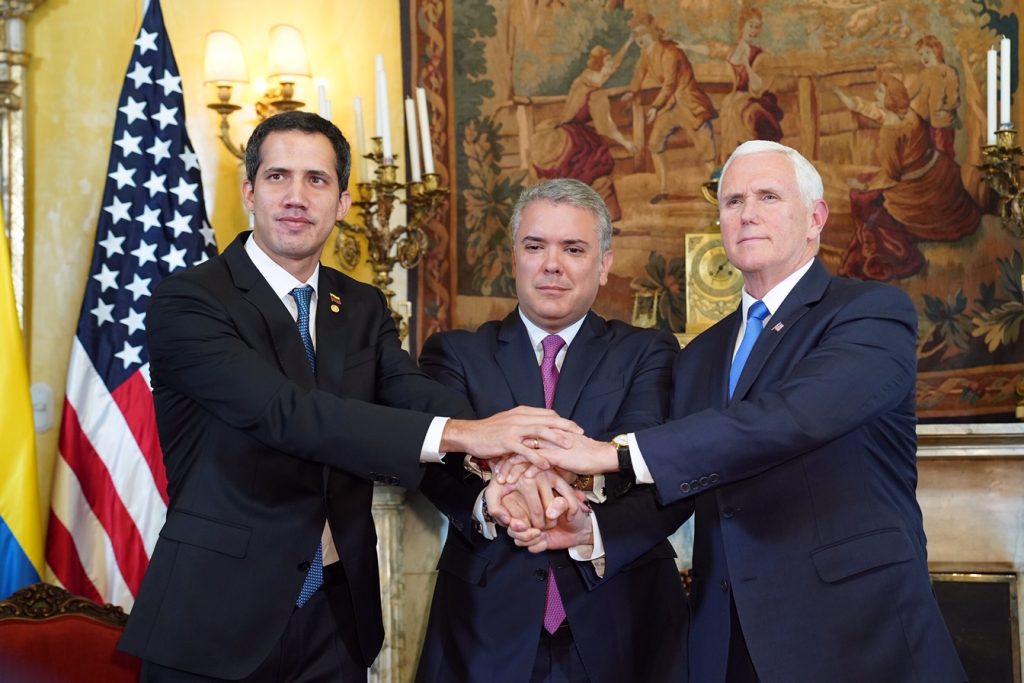
Every country that supports a restoration of democracy should specifically use UNGA’s international spotlight to condemn Russian interference.”
Juan Guaidó (Left) meets with US Vice President Mike Pence (right) and Colombian President Iván Duque Márquez (center) in Bogota in February, 2019. Much of the world’s attention and optimism turned to Guaidó and as of January 23, 2019, the interim president of Venezuela, as of now recognized by more than fifty democracies. Official White House Photo by D. Myles Cullen
Meanwhile, day-to-day life in Venezuela continues to deteriorate. Food insecurity and malnutrition are at sky-high levels. As noted in the Bachelet report, in April 2019 the Venezuelan minimum wage, which sits around $7 per month, only covers 4.7 percent of the basic food basket. More than 80 percent of households in Venezuela are food insecure, with the majority of those interviewed as part of the Bachelet investigation consuming only one meal per day.39Venezuela: Numbers Highlight Health Crisis,” Human Rights Watch, November 15, 2018, https://www.hrw.org/news/2018/11/15/venezuela-numbers-highlight-health-crisis. The report highlights that, as a result of hyperinflation and the disintegration of Venezuelan food production, an estimated 3.7 million Venezuelans are malnourished. Children and pregnant women are the demographics most likely to suffer from malnutrition in Venezuela. Survival is a struggle. As a result, Venezuelan refugees filed more asylum claims globally in 2018 than citizens of any other country, including Syria.40Christine Armario and Franklin Briceño, “UN: Venezuelans now file 1 in 5 of all new asylum claims,” AP News, June 19, 2019, https://www.apnews.com/6ad91a0a6188453491d75564739780d9. If the situation does not improve, the number of Venezuelan migrants and refugees is expected to reach around 8 million in 2020, surpassing total Syrian migration numbers by more than 3 million.
Although the situation is clearly untenable, there are several likely scenarios for Venezuela. Each will have implications for Moscow, which is not likely to sit by quietly. What should the international community be prepared for?
Scenario 1. Ongoing Stalemate with Continued Repression by Maduro
One likely scenario is sustainment of the status quo, with the Guaidó government accelerating its international support but unable to remove the Maduro regime. Under this scenario, protests continue, but pose no threat to Maduro. The regime continues its repression, with periodic crackdowns that can become violent. National Assembly representatives are increasingly persecuted and more elected officials go into hiding or exile. As a result, the opposition loses some capacity to organize within Venezuela, while interim government leaders in the diaspora increasingly adopt the more militant perspectives.
International Response: The United States will continue to ramp up sanctions, increasingly targeting the countries with which Maduro conspires, though illegal trade keeps the regime afloat.41Jennifer Hansler, “US claims latest Venezuela sanctions put Maduro ‘on notice’,” CNN, August 6, 2019, https://www-m.cnn.com/2019/08/06/politics/us-venezuela-sanctions-executive-order/index.html?r=https%3A%2F%2Fwww.google.com%2F. The international community could even block oil tankers, gold smugglers, and drug traffickers from entering or leaving the country. This requires support from Venezuela’s neighbors on land as well as from countries in the Caribbean. The EU places more sanctions on specific individuals and blocks assets of regime officials in key countries.
Russian Response: With the United States continuing to support Guaidó but no longer hinting at an intervention, Moscow sees its backing of Maduro as a low-cost way to sow instability in the United States’ hemisphere. Russia continues occasional military deployments to Venezuela as an irritant to Washington but does not need to devote considerably more resources or time to keep the situation at a simmer. The Russians keep helping the Maduro regime to evade sanctions and, together with Turkey, China, Cuba, and other key allies, allow him to survive another day.
Subscribe to the #AlertaVenezuela newsletter
To receive future editions of the #AlertaVenezuela newsletter each week, sign up below!
Scenario 2. Power Vacuum
Maduro leaves office amid divisions among his likely successors, while only some security forces support the interim government, and a power vacuum arises. No one—the government, Guaidó, the police, the military—has control over the entire country. Energy assets, in which Russia is heavily invested, are at risk. Irregular armed forces tighten their control over some territory, with the potential to mount terrorism attacks, as in Colombia in the past.42“ELN in Venezuela,” InSight Crime, March 11, 2019, https://www.insightcrime.org/venezuela-organized-crime-news/eln-in-venezuela/. Illegal trade grows without check, and Venezuela becomes an even more fruitful spot for international terror networks to operate. The Bolivarian Colectivos—irregular armed groups who carry out orders directly from Maduro—ramp up their attacks in urban areas to cement their control during a time in which these groups are threatened as well.43Lucia Newman, “Venezuela: Who are the colectivos,” Al Jazeera, May 9, 2019, https://www.aljazeera.com/blogs/americas/2019/05/venezuela-colectivos-190506163125345.html. The armed forces supporting the interim government focus on providing protection only to critical government assets while the rest of the country falls into increasing disarray as security forces devolve into small bands struggling for day-to-day survival.
International Response: Venezuela’s neighbors could call on the United States for support to restore order, and the interim government could ask for US advisors. If requested by the Guaidó government, a multilateral force through the Lima Group—as part of the Inter-American Treaty of Reciprocal Assistance, or the Rio Treaty—could be organized.44Peter J. Meyer, “ The Inter-American Treaty of Reciprocal Assistance and the Crisis in Venezuela,” CRS Insight, May 14, 2019, https://fas.org/sgp/crs/row/IN11116.pdf. In July 2019, the Guaidó government formally requested to rejoin the Rio Treaty, which states that an attack against one member country is an attack on all members. The interim government might also request a formal UN peacekeeping mission. Finally, the international community could respond with massive shipments of humanitarian aid to Venezuela, which would then face the prospect of sabotage by armed groups.
Russian Response: Putin might ramp up his rhetoric about the chaos being caused by the West, but if the United States commits military forces to help restore order, Moscow is highly unlikely to intervene directly with significant military support. In this scenario, Washington should engage with Moscow, as it did during the crisis with Wagner mercenaries in Syria in February 2018. Washington should note to the Kremlin where Maduro’s forces are engaged in unacceptable behavior, express its intention to stop those forces and, if its intelligence suggests that Russian troops are in the area, offer those troops a safe exit corridor. Russian troops would likely be engaged in order to protect key Russian assets. Here, the purpose is deconfliction, but the United States should not permit the ongoing presence of Russian forces after a warning and time for evacuation. While a risk-taker, Putin tries to have a viable exit strategy, and in Venezuela he is operating off a long supply line close to the United States. So, while he might provoke US action in Venezuela, he will not stand and fight there. Russia will continue to veto, however, any action in support of the interim government at the United Nations.
To what extent does Russia seek to protect Rosneft assets? It is likely to use military contractors to protect energy investments amid the chaos. The interim government would score points with Moscow if it took steps to ensure that any foreign capital is not threatened or at least, if force projection is not possible, calls on all players to safeguard international assets in the country. Any resolution to the Venezuela crisis in which Maduro falls and Putin “loses” might prompt the Kremlin to strike somewhere else—possibly in Syria, but more likely in Ukraine or even Belarus.
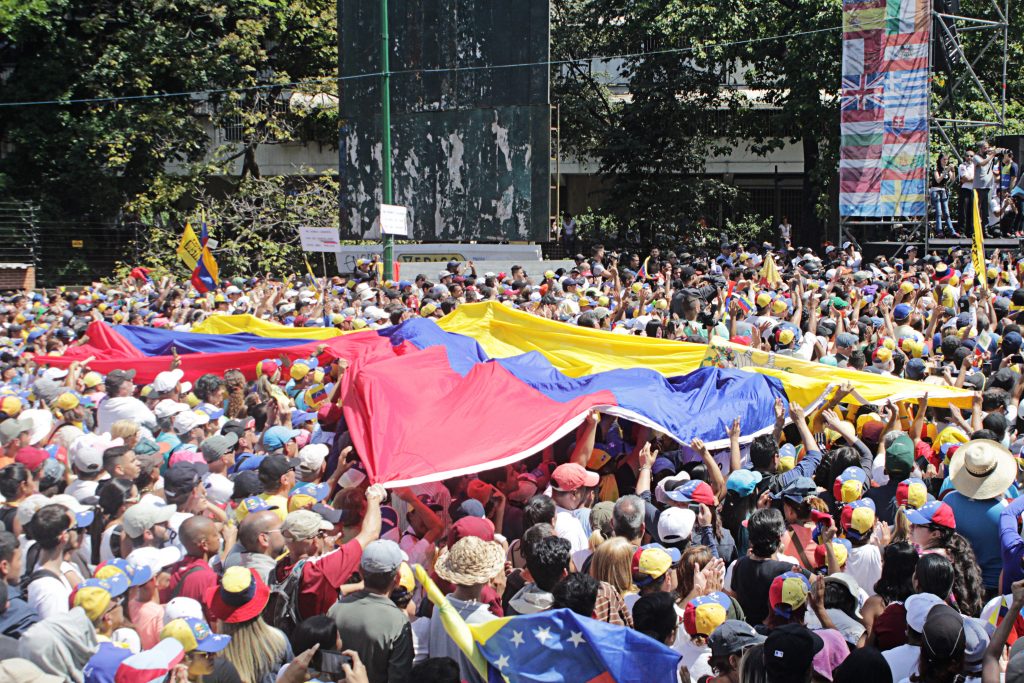
As Venezuelans continue to protest the country’s worsening humanitarian crisis, the current position of the Maduro regime is clearly untenable. Photo: Wikimedia/AlexCocoPro
Scenario 3. Internal Fissures Lead the Regime to Replace Maduro
Maduro’s real power and influence is subject to much debate. He is not a typical strongman with the entire government and security apparatus in his grip. Rather, Diosdado Cabello, president of the National Constituent Assembly, holds perhaps more sway in many circles. Defense Minister Vladimir Padrino López, another figure with a considerable circle of influence, controls many commercial enterprises, such as the Bank of the National Bolivarian Armed Forces (BANFANB), the Communications System of the National Bolivarian Armed Forces (EMCOFANB), and the investment fund FIMNP (Fondo de Inversión Misión Negro Primero. These men and other high-ranking officials are loyal not to Maduro but to the system that benefits them and their families at the expense of the Venezuelan people. In this scenario, the short-term fate of the country would depend on whether Cabello, López, or some dark horse figure took the reins. Cabello, for instance, is a hard-liner, while a dark horse could usher in a transitional government that takes a softer approach and includes some elements of the democratic forces.
It could be Maduro’s missteps and weaknesses or replacing him as a vehicle to divide the international community that prompt loyalists to rise up, either as an individual in control of the presidential palace or a group of officials who collectively govern the country. Elections might be called in this scenario, but only if mechanisms are in place to ensure that the Chavista top brass retain control.
International Response: The downfall of Maduro would spark jubilation throughout the international community, and Venezuelans would celebrate it as a key step toward restoring democracy. But whoever succeeds Maduro through a coup d’état is unlikely to countenance political compromise. The next leader could quickly seek to soften his or her stance on certain divisive issues, with the goal of peeling away some international support for sanctions and the interim government. They might target their appeals to the most tepid supporters of the Guaidó government. Some countries or alliances, most notably the EU, would be the quickest to lift certain sanctions as a carrot in the democratization process.
Russian Response: The Russians would seek to maintain their influence inside Venezuela in order to make sure their loans are repaid and their assets protected. Russia would go to great lengths to show its support for a new Chavista government, as it would be critical to ensure a continued foothold in the hemisphere in a strategic location.
Scenario 4. Negotiated Solution Results in a Transitional Government
Negotiations produce an agreement under which the Maduro regime agrees to free and fair elections with credible international election observation. The regime likely pushes to stay in power through the elections. If this is seen as a credible win by the Guaidó government, the international community falls in line behind the deal. Of course, this scenario could result in a Chavista winning the eventual election. One of Caracas’ key demands in this scenario would be that countries lift some sanctions prior to the election, although Washington is unlikely to offer such preemptive relief. Here as well, a humanitarian channel is opened, but international organizations are forced to work with a transitional government that likely includes some members of Chavismo and Madurismo (Maduro supporters).
International Response: A negotiated solution would be a major win for the Lima Group and the broader international community. Mechanisms would have to be immediately put in place to ensure transparent electoral observation—through the Organization of American States, the UN, and individual election observation organizations. The UN would be called in to provide humanitarian assistance.
Russian Response: If an agreement has the backing of Maduro and his supporters, Russia is likely to support it as well. Most critical for this support are legal guarantees that Russian assets and debt are protected post-election. But in return for its consent to the agreement, Russia would likely demand concessions in other, more strategic areas of the world.
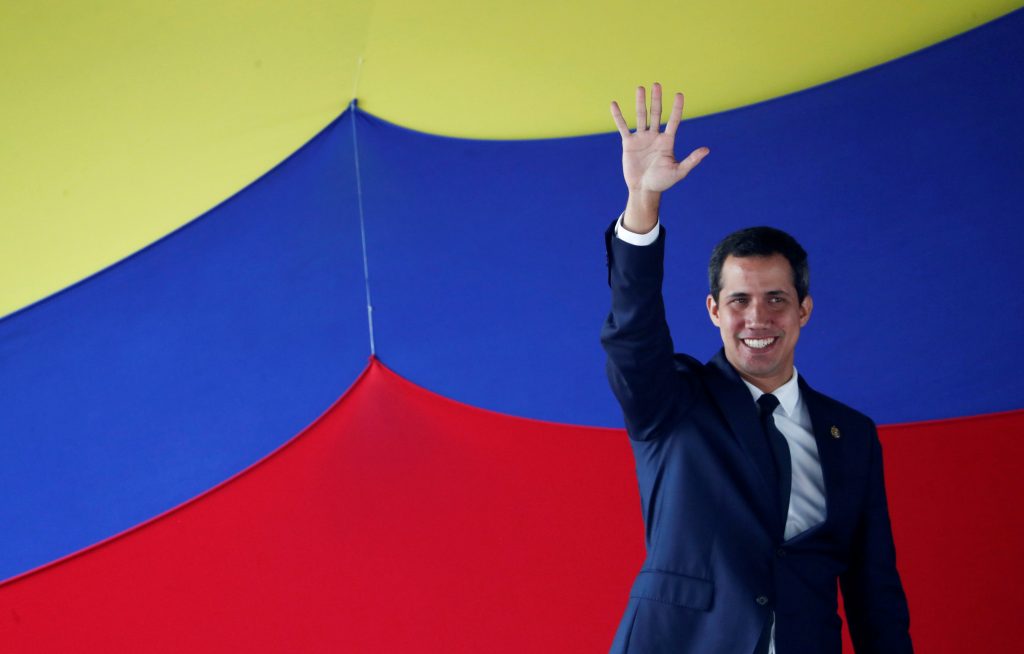
Russia’s continued support for Maduro and his allies will only continue to strengthen the regime’s position and frustrate efforts to restore democracy.”
Venezuelan opposition leader Juan Guaido, who many nations have recognized as the country’s rightful interim ruler, waves as he arrives to a session of Venezuela’s National Assembly at a public square in Caracas, Venezuela July 23, 2019. REUTERS/Carlos Garcia Rawlins
Policy Recommendations
At the time of the launch of this paper, it was still unclear if the Barbados talks between the Maduro regime and the interim government would result in a mutually-accepted path toward a democratic transition in Venezuela. But one thing is clear: Russia’s continued support for Maduro and his allies will only continue to strengthen the regime’s position and frustrate efforts to restore democracy.
The following policy recommendations provide courses of action that target key pressure points in Russia’s diplomatic and economic relations with the Maduro regime. Importantly, a more coordinated and assertive international approach could synchronize efforts to address the migration crisis affecting the region and undermine Russia’s attempts to bolster the regime.
Propel a diplomatic hit on Russia at UNGA
With all eyes on the United Nations General Assembly (UNGA) in September 2019, the more than fifty countries that recognize the interim government of Juan Guaidó will have the opportunity to elevate the conversation about the Venezuelan crisis and the urgent need for a democratic restoration at the highest levels. UNGA will be especially important for the Lima Group countries and the EU to call out Russia for its role in helping to sustain the Maduro regime and how continued ties to the Kremlin are exacerbating the regional and global implications of the Venezuela crisis. Every country that supports a restoration of democracy should specifically use UNGA’s international spotlight to condemn Russian interference.
Place additional pressure on Russia through the Lima Group
Brazil, a BRICS member, is Russia’s largest trading partner in Latin America. Peru is a key client of Russian weapons—Russian arms represented 24 percent of its total arms purchases between 2012 and 2017. Argentina’s energy industry is of special interest to the Kremlin. Of all the members of the Lima Group, these countries are uniquely positioned to put in place a series of coordinated economic and diplomatic pressures that could individually or collectively threaten core Russian interests in the region. Countries could begin by barring entry to Russian officials who have direct links to Maduro. Moreover, Lima Group members could decide to refrain from doing business with any Russian entity that is also supporting the Venezuelan regime. Brazil would be the ideal leader in such an effort, given Brazil-Russia economic relations, and most importantly, this type of action would strain its BRICS partnership with Moscow—a source of national pride for the Kremlin.
Expand US and EU coordinated sanctions
Even as the United States ramps up sanctions on the Maduro regime, Russia, along with its international partners, helps Maduro and his cronies avoid the brunt of the impact to their coffers. The EU, in coordination with the United States, should issue a new wave of sanctions that target Maduro himself and the families of his closest advisers. Additionally, the EU and the United States should issue sanctions on Russian firms that are doing business with Maduro’s Venezuela. The United States has taken such actions over the last few years, including sanctioning Maduro in July 2017, his three stepsons in July 2019, and other family members. In total, the United States has sanctioned 163 Venezuelans affiliated with the Maduro regime.45Clare Ribando Seelke and Mark P. Sullivan, “Venezuela: Overview of U.S. Sanctions,” Congressional Research Service, July 5, 2019, https://fas.org/sgp/crs/row/IF10715.pdf.
Provide more resources for Colombia and other countries receiving Venezuelan migrants
Moscow’s support of Maduro is further exacerbating the humanitarian crisis and will help to spur great outflows of Venezuelan migrants and refugees. Thus, it’s also imperative that the international community pledge and provide additional resources to help Latin American countries that are using substantial fiscal resources to welcome and provide a safe environment for Venezuelans. Priority should be given to Colombia, which has received more than 1.3 million Venezuelan migrants.46“Refugees and migrants from Venezuela top 4 million: UNHCR and IOM,” United Nations High Commissioner for Refugees (UNHCR), June 7, 2019, https://www.unhcr.org/en-us/news/press/2019/6/5cfa2a4a4/refugees-migrants-venezuela-top-4-million-unhcr-iom.html. Today, the Colombia-Venezuela border sees around 5,000 border crossings daily.47Manuel Rueda and Luz Dary Depablos, “Thousands pour into Colombia as Venezuela reopens border,” June 8, 2019, https://www.apnews.com/11624a3c53fe4d659da283cbc0b9c4dc. If nothing changes, at least 1,825,000 border crossings can be expected for 2019.
Create conditions in Latin America that prevent Russian military from propping up Maduro
As the crisis in Venezuela worsens, Russian military advisers may advise or initiate a crackdown to try to stop the Venezuelan military or demonstrators from removing Maduro. The United States should work to prevent this contingency by working with the Lima Group to 1) build pressure on Moscow not to support or participate in a crackdown and 2) to recognize the possible need for the United States to counter Russian military support for Maduro.
Set clear redlines for and offer assurances to Moscow
The United States should convey to Moscow that it would consider all options if Maduro cracks down on demonstrators. The United States should likewise convey that it would not trade support for friends elsewhere (e.g., Ukraine) in exchange for Russian cooperation in Venezuela. At the same time, the United States should provide assurances that Maduro’s removal would not endanger Russia’s economic assets in Venezuela.
Conclusion
Moscow’s interference around the world has protracted crises and given new life to ruthless leaders. Today, Russia’s efforts to prop up Nicolás Maduro have been a relatively low-cost, but high-reward strategy for Moscow to sow further instability in the United States’ own hemisphere. Venezuela presents an opportunity for Russia to play the role of spoiler—in some capacity—in a crisis near the United States, and to promote its own commercial interests, and preferred image as a growing power. It’s an opportunity to plant the flag, foster instability, and have leverage over key energy resources at the same time. It is imperative that the current dynamics are reversed so that Moscow’s foray into Venezuela comes at a higher cost and is seen as a public relations disaster for Putin back home. Continued meddling will only help to prolong the suffering of the Venezuelan people.
Further reading
Related experts
Image: Russian President Vladimir Putin (R) shakes hands with his Venezuelan counterpart Nicolas Maduro during a meeting at the Novo-Ogaryovo state residence outside Moscow, Russia December 5, 2018. REUTERS/Maxim Shemetov
